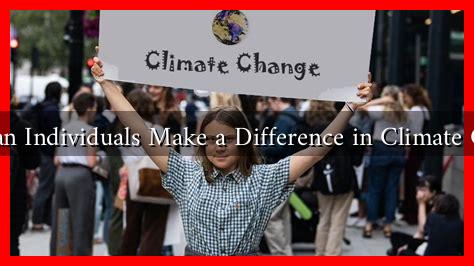-
Table of Contents
How Can Individuals Make a Difference in Climate Change?
Climate change is one of the most pressing issues of our time, affecting ecosystems, economies, and communities worldwide. While large-scale policy changes and corporate responsibility are crucial, individual actions can also play a significant role in combating climate change. This article explores various ways individuals can make a difference, supported by examples, statistics, and actionable steps.
Understanding the Impact of Individual Actions
Many people may feel that their individual efforts are insignificant in the grand scheme of climate change. However, collective action can lead to substantial change. According to a report by the United Nations, if every person in the world reduced their carbon footprint by just 1 ton per year, it would equate to a reduction of 7.8 billion tons of CO2 emissions globally. This statistic highlights the power of individual contributions.
Practical Steps Individuals Can Take
Here are several practical steps individuals can take to reduce their carbon footprint and contribute to climate change mitigation:
- Reduce Energy Consumption: Simple changes in daily habits can lead to significant energy savings. Consider the following:
- Switch to energy-efficient appliances.
- Use LED light bulbs instead of incandescent ones.
- Unplug devices when not in use.
- Adopt Sustainable Transportation: Transportation is a major contributor to greenhouse gas emissions. Individuals can:
- Use public transportation, carpool, or bike whenever possible.
- Consider electric or hybrid vehicles.
- Walk for short distances instead of driving.
- Practice Sustainable Eating: The food industry is a significant source of emissions. To make a difference, individuals can:
- Reduce meat and dairy consumption.
- Choose locally sourced and seasonal foods.
- Minimize food waste by planning meals and using leftovers.
- Support Renewable Energy: Transitioning to renewable energy sources is vital. Individuals can:
- Opt for green energy plans from their utility providers.
- Invest in solar panels for their homes.
- Advocate for policies that support renewable energy initiatives.
- Engage in Community Initiatives: Collective efforts can amplify individual actions. Individuals can:
- Participate in local clean-up events or tree-planting initiatives.
- Join or support organizations focused on environmental advocacy.
- Educate others about climate change and sustainable practices.
Case Studies of Individual Impact
Several individuals and communities have made significant strides in combating climate change through grassroots efforts:
- Greta Thunberg: The young climate activist has inspired millions worldwide to take action through her school strike for climate movement, emphasizing the importance of youth voices in climate advocacy.
- Community Solar Projects: In various regions, communities have come together to create solar co-ops, allowing individuals to invest in renewable energy collectively, reducing costs and increasing access to clean energy.
The Role of Education and Advocacy
Education is a powerful tool in the fight against climate change. Individuals can:
- Stay informed about climate issues through reputable sources such as the Intergovernmental Panel on Climate Change (IPCC).
- Engage in discussions about climate change in their communities and online platforms.
- Advocate for policies that promote sustainability at local, national, and global levels.
Conclusion
While the challenge of climate change may seem daunting, individual actions can collectively lead to significant change. By adopting sustainable practices, engaging in community initiatives, and advocating for policy changes, individuals can contribute to a healthier planet. Every small action counts, and when multiplied by millions, these efforts can create a ripple effect that drives meaningful progress in the fight against climate change. Together, we can make a difference.

